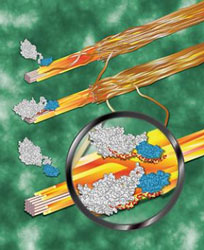 Cornell University researchers have reportedly discovered a class of plant enzymes that potentially could allow plant materials used to make ethanol to be broken down more efficiently than is possible using current technologies.
Cornell University researchers have reportedly discovered a class of plant enzymes that potentially could allow plant materials used to make ethanol to be broken down more efficiently than is possible using current technologies.
According to Jocelyn Rose, Cornell assistant professor of plant biology, the breakthrough could make the production of cellulosic ethanol less expensive.
“The bottleneck for conversion of lignocellulose into ethanol is efficient cellulose degradation,” said Rose in a Cornell news release. “The discovery of these enzymes suggests there might be sets of new plant enzymes to improve the efficiency of cellulose degradation.”
The diagram from Cornell Theory Center shows the newly discovered class of plant enzymes with a cellulose-binding module (shown in blue), sticking to a plant cell wall. The binding module of the enzyme helps the catalytic region of the enzyme (shown in more detail in gray in the pullout part of the picture) break down the crystalline cellulose.

